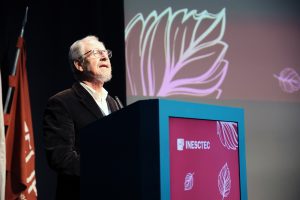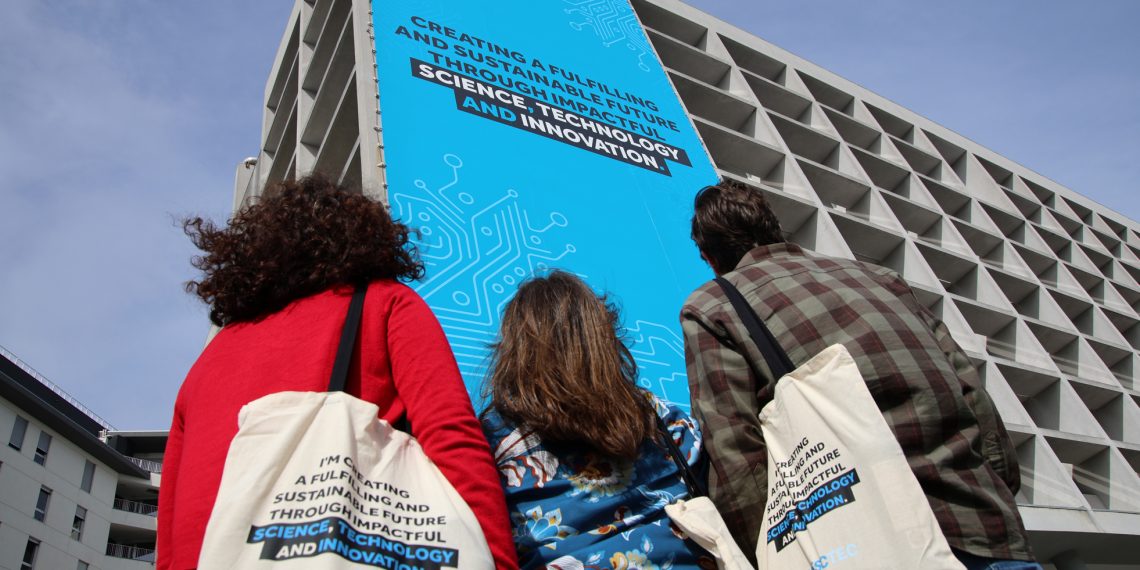The current geopolitical situation and changes in European research funding rules in the field of defence pose new challenges to INESC TEC. Focusing on research and ethics for the future, the series features hours of thought-provoking discussions with five renowned experts – available to all.
INESC TEC launched a series of talks on ethics applied to research and defence. To understand their relevance and timeliness, one only needs a few minutes of the session with Álvaro de Vasconcelos. In fact, we live in an era with many “questions, doubts and perplexities”, and the “certainties and clear interpretations” are lacking: “the world changes every minute”.
The cycle, INESC TEC Open Talks on Ethics in Research and Defence, aims to help us think through this ever-shifting world. Five sessions, five outlooks from national and international experts reflecting on issues like the role of AI in military contexts, the limits of facial recognition, and the right of researchers to claim conscientious objection – all within a climate of uncertainty where the spectre of war has once again entered our daily lives.
According to Pedro Guedes de Oliveira, chair of INESC TEC’s Ethics Committee, “for a long time”, all research related to life has demanded “particular ethical consideration from the scientific community.” “The involvement of researchers from engineering areas brings us closer to these ethical issues, and one must reflect on our behaviour and concerns,” he added.

Indeed, these “ethics-related questions” follow every stage of the scientific and technological process. Catherine Tessier, research director at ONERA, emphasised that ethics means raising questions about “topics, situations, possible decisions and actions”; in this sense, they cannot be reduced to a preliminary checklist that is quickly set aside once a research project begins.
“Raising awareness”
Alongside Álvaro de Vasconcelos and Catherine Tessier, Virginia Dignum, Afonso Seixas-Nunes and Michael Teutsch also contributed to what Pedro Guedes de Oliveira described as a very “interesting and valuable” exchange of ideas. In a time of “increasing digital means of accessing information”, when privacy and data protection frequently make the headlines, he argued that a multidisciplinary institute like INESC TEC must “help raise awareness” among the community, namely concerning these complex issues.
In addition, Pedro Guedes de Oliveira mentioned that “the emergence of Artificial Intelligence and the growing presence in almost every aspect of our lives, forces us to address new challenges and concerns, both on a global scale and in our professional activities.”
The series began in late 2024, and all sessions are now available on the INESC TEC YouTube channel – for those who missed them live or wish to revisit them. A sixth conference is already planned for later this year.
A brief look at the five sessions
The cycle opened with Catherine Tessier, who asked: “My facial recognition system is 100% accurate – is that good news?” The ONERA research director – who also heads the Office of Ethics and Integrity in Research at the French aerospace lab, headquartered in Toulouse -, discussed the importance of ethical reflection running parallel to scientific work among researchers – beyond mere acceptance or objection.
Next came Virginia Dignum, professor at Umeå University (Sweden) and member of the European Commission’s High-Level Expert Group on Artificial Intelligence. In her talk, “Beyond the Hype: Balancing Innovation and Social Responsibility in AI”, she emphasised that responsibility in AI involves regulation, governance and awareness-raising, as well as the design of systems that focus on values, law implementation, governance, monitoring and compliance with norms and standards.
Álvaro de Vasconcelos, founder of the Fórum Demos and holder of the José Bonifácio Chair at the University of São Paulo, focused on the need for a new multilateralism – and on building a future grounded in compassion, “defending the rights of those without rights, and advancing social justice.”
The fourth session, led by Afonso Seixas-Nunes – priest and professor of Law – began with a challenging question: Can traditional subjective reasoning truly be replaced by AI systems? Drawing on the ongoing war in Gaza, he explored the notion of “proportionality” in wartime decision-making.
The series’ first phase concluded with Michael Teutsch, AI strategist and leader at HENSOLDT, who explored the integration of AI in military applications, highlighting the critical need to comply with ethical guidelines.
As mentioned before, the Open Talks series will continue later this year, with a sixth session scheduled for late November.


 News, current topics, curiosities and so much more about INESC TEC and its community!
News, current topics, curiosities and so much more about INESC TEC and its community!